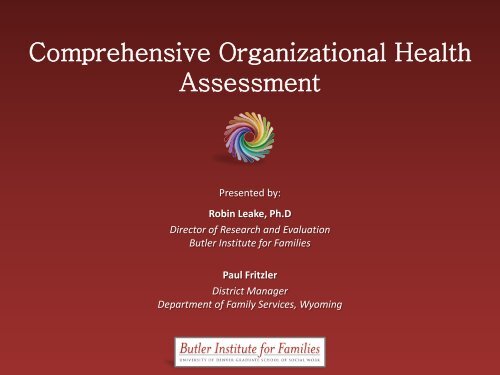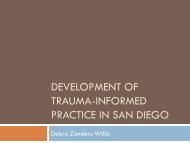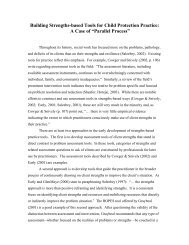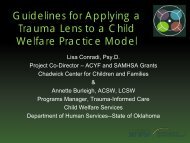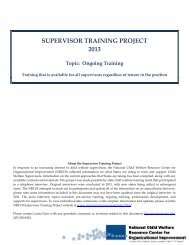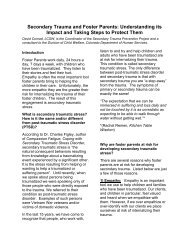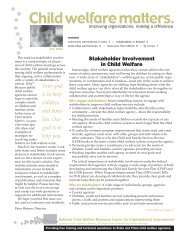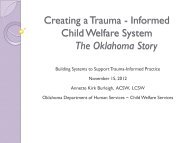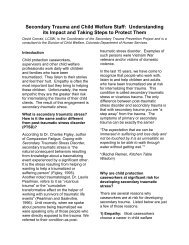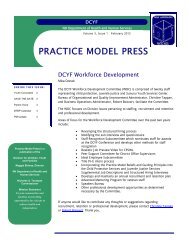Comprehensive Organizational Health Assessment - Muskie School ...
Comprehensive Organizational Health Assessment - Muskie School ...
Comprehensive Organizational Health Assessment - Muskie School ...
Create successful ePaper yourself
Turn your PDF publications into a flip-book with our unique Google optimized e-Paper software.
<strong>Comprehensive</strong> <strong>Organizational</strong> <strong>Health</strong><br />
<strong>Assessment</strong><br />
Presented by:<br />
Robin Leake, Ph.D<br />
Director of Research and Evaluation<br />
Butler Institute for Families<br />
Paul Fritzler<br />
District Manager<br />
Department of Family Services, Wyoming<br />
<strong>Comprehensive</strong> <strong>Organizational</strong> <strong>Health</strong> <strong>Assessment</strong> May 2012 Butler Institute for Families
Purpose of the COHA<br />
Develop and test an assessment battery that<br />
accurately captures the organizational strengths<br />
and needs of child welfare agencies.<br />
<strong>Comprehensive</strong> <strong>Organizational</strong> <strong>Health</strong> <strong>Assessment</strong> May 2012 Butler Institute for Families
What is <strong>Organizational</strong> <strong>Health</strong>?<br />
Holistic conceptualization of<br />
workforce practices and<br />
organizational climate and<br />
culture factors that directly<br />
impact service delivery, the<br />
achievement of agency goals<br />
and objectives and outcomes<br />
for children and families<br />
<strong>Comprehensive</strong> <strong>Organizational</strong> <strong>Health</strong> <strong>Assessment</strong> May 2012 Butler Institute for Families
What is <strong>Organizational</strong> <strong>Health</strong>?<br />
<strong>Organizational</strong> Culture:<br />
Organization’s behavioral expectations of employees<br />
and the way the work is done in the organization<br />
<strong>Organizational</strong> Climate:<br />
Experience of working in an agency<br />
What is it like to work here?<br />
<strong>Comprehensive</strong> <strong>Organizational</strong> <strong>Health</strong> <strong>Assessment</strong> May 2012 Butler Institute for Families
What is the COHA?<br />
Mixed-Methods design includes:<br />
• 300-item staff survey (online and<br />
paper/pencil)<br />
• Individual and group interviews<br />
with all levels of agency staff<br />
• Interviews with clients (biological,<br />
adoptive, and foster families and<br />
transitioning youth)<br />
• Interviews with community<br />
partners and providers<br />
<strong>Comprehensive</strong> <strong>Organizational</strong> <strong>Health</strong> <strong>Assessment</strong> May 2012 Butler Institute for Families
COHA Survey Domains<br />
<strong>Organizational</strong> Factors<br />
• Leadership<br />
Individual Factors<br />
• Self-efficacy<br />
• Job satisfaction<br />
• Intent to stay<br />
• Trauma<br />
• Coping skills<br />
• Time Pressure<br />
Unit Factors<br />
• Supervision<br />
• Professional<br />
sharing & support<br />
• Team cohesion<br />
• Shared vision &<br />
professional<br />
orientation<br />
• Physical<br />
environment<br />
• Cultural<br />
responsiveness &<br />
Inclusivity<br />
• Readiness for<br />
change<br />
• Public perception<br />
• Community<br />
resources<br />
<strong>Comprehensive</strong> <strong>Organizational</strong> <strong>Health</strong> <strong>Assessment</strong> May 2012 Butler Institute for Families
Western Workforce Project<br />
COHA conducted with:<br />
• Three State Agencies<br />
— State agencies range from 28<br />
to 900 staff<br />
• Two Tribal Child Welfare<br />
Programs<br />
– Tribal child welfare programs<br />
are small, with 12-16 staff<br />
<strong>Comprehensive</strong> <strong>Organizational</strong> <strong>Health</strong> <strong>Assessment</strong> May 2012 Butler Institute for Families
Methods for the Western Workforce<br />
Project<br />
COHA administered agency-wide at:<br />
Year 1 Year 5<br />
Baseline<br />
Midpoint<br />
End<br />
• Two county agencies and two tribal agencies<br />
• COHA adapted for use with two Implementation Center<br />
Projects<br />
<strong>Comprehensive</strong> <strong>Organizational</strong> <strong>Health</strong> <strong>Assessment</strong> May 2012 Butler Institute for Families
Methods for the Western Workforce<br />
Project<br />
Agency Workforce Initiative Developed:<br />
The Design Team<br />
• Members from all<br />
organizational levels<br />
• Develop & implement<br />
workforce interventions<br />
based on COHA<br />
Unit Learning Circles<br />
• Led by supervisors<br />
• Identify areas of practice<br />
or unit climate where<br />
improvement is desired<br />
• Engage in group practice<br />
development using a<br />
group model<br />
<strong>Comprehensive</strong> <strong>Organizational</strong> <strong>Health</strong> <strong>Assessment</strong> May 2012 Butler Institute for Families
Many Hats of the COHA<br />
The COHA is a multi-purpose assessment:<br />
1. Used diagnostically to help agencies identify areas of<br />
strength and opportunities for improvement and<br />
drive practice changes<br />
• Administration of COHA “launched” the projects and<br />
started dialogue about organizational health<br />
• Results presented in easy to read brief<br />
• Facilitated in-person review of findings and strategic<br />
planning to guide target intervention areas<br />
<strong>Comprehensive</strong> <strong>Organizational</strong> <strong>Health</strong> <strong>Assessment</strong> May 2012 Butler Institute for Families
Many Hats of the COHA<br />
2. COHA designed as a pre-post assessment to measure<br />
changes in organizational health that result from the<br />
Western Workforce Intervention (evaluation tool)<br />
3. <strong>Organizational</strong> Climate and Culture measures used to<br />
test theoretical models<br />
<strong>Comprehensive</strong> <strong>Organizational</strong> <strong>Health</strong> <strong>Assessment</strong> May 2012 Butler Institute for Families
Culturally-based Methods<br />
• Build relationships and trust with key leaders<br />
• When working with tribes:<br />
– Go through appropriate channels to gather permission to<br />
collect data from tribe<br />
– Arrange data sharing and data ownership agreement<br />
• Data collection face-to-face as much as possible<br />
<strong>Comprehensive</strong> <strong>Organizational</strong> <strong>Health</strong> <strong>Assessment</strong> May 2012 Butler Institute for Families
• Mixed methods design: Focus on quantitative and<br />
qualitative data, listening and honoring all voices,<br />
providing the story behind the numbers<br />
– Qualitative data is culturally appropriate, and often<br />
quantitative data not feasible due to low n<br />
• Present results that are utilization-focused and<br />
accessible<br />
– Present findings face-to-face<br />
<strong>Comprehensive</strong> <strong>Organizational</strong> <strong>Health</strong> <strong>Assessment</strong> May 2012 Butler Institute for Families
COHA Analysis<br />
• Initial Reliabilities ranged from .68 to .97<br />
• Descriptive Statistics re: COHA Scales<br />
• Qualitative Analysis of Interview and Focus Group Data<br />
• Exploratory and confirmatory factor analysis showed that<br />
some of the scales did not factor as unique constructs as<br />
intended<br />
• Revised COHA survey battery and re-tested in Round 2<br />
• Analysis of revised battery demonstrates strong reliability<br />
and validity of measures<br />
<strong>Comprehensive</strong> <strong>Organizational</strong> <strong>Health</strong> <strong>Assessment</strong> May 2012 Butler Institute for Families
The Casper, WY COHA<br />
Baseline administered in July 2009<br />
• 100% response rate for staff participating in<br />
the survey (n=28) and focus groups and/or<br />
interviews<br />
• Interviews conducted with families,<br />
community providers and partners<br />
“Results Brief” of COHA results<br />
• Evaluators and project team presented<br />
findings in an all-staff meeting and facilitated<br />
discussion and planning<br />
<strong>Comprehensive</strong> <strong>Organizational</strong> <strong>Health</strong> <strong>Assessment</strong> May 2012 Butler Institute for Families
COHA Baseline Results<br />
Coping and<br />
Resiliency of staff<br />
Community resource<br />
Physical work<br />
environment and<br />
work flexibility<br />
Leadership and<br />
Supervision<br />
Job satisfaction<br />
Readiness for change<br />
Cultural<br />
responsiveness<br />
<strong>Comprehensive</strong> <strong>Organizational</strong> <strong>Health</strong> <strong>Assessment</strong> May 2012 Butler Institute for Families
Casper Intervention<br />
Design Team<br />
• Identified priority focus areas from the COHA results<br />
and developed action plan with goals, objectives<br />
outcomes, timelines and roles/responsibilities<br />
Learning Circles<br />
• Supervisors trained and coached on Learning Circle<br />
approach and LC topics focused on organizational<br />
workforce interventions for the unit level<br />
<strong>Comprehensive</strong> <strong>Organizational</strong> <strong>Health</strong> <strong>Assessment</strong> May 2012 Butler Institute for Families
Action Plan<br />
Goal 1: Supervision<br />
– Supervisors will provide success-focused supervision<br />
that is consistent, functions as a united supervisory<br />
group, and enhances workers’ ability to do their jobs<br />
• Objectives:<br />
– Consistent case reviews<br />
– Develop standard operating procedures manual<br />
<strong>Comprehensive</strong> <strong>Organizational</strong> <strong>Health</strong> <strong>Assessment</strong> May 2012 Butler Institute for Families
Action Plan<br />
Goal 2: Job Satisfaction<br />
– Employees at DFS will have improved job satisfaction<br />
• Objectives:<br />
– Flexible workforce (move workers where they are<br />
needed most)<br />
– Develop clear expectations for supervision<br />
– Improve organizational climate<br />
<strong>Comprehensive</strong> <strong>Organizational</strong> <strong>Health</strong> <strong>Assessment</strong> May 2012 Butler Institute for Families
COHA Follow-up Results<br />
Participation<br />
• Survey administered in July 2011<br />
• 100% response rate for staff participating in the<br />
survey (n=28) and focus groups and/or interviews<br />
Results Brief<br />
• Highlighted areas of strengths and challenges across<br />
individual, unit and agency-level factors<br />
• Showcased changes since baseline<br />
• Guided planning and next steps for Design Team<br />
<strong>Comprehensive</strong> <strong>Organizational</strong> <strong>Health</strong> <strong>Assessment</strong> May 2012 Butler Institute for Families
Example COHA Results<br />
UNIT / LOCAL LEVEL FACTORS<br />
<strong>Health</strong>y Team Culture and Climate<br />
1 2 3 4 5 6<br />
Challenge/Concern Watch Area Strength<br />
Area Description Score & Standard Deviation (SD)<br />
Community<br />
Resources*<br />
Although still technically in the “watch area”, The mean score<br />
suggests a somewhat positive perception about the<br />
availability of resources for families served by the agency,<br />
and an improvement from the previous COHA. Seventy-five<br />
percent of staff reported strong positive relationships<br />
between the agency and community providers and the<br />
availability of substance abuse, mental health and domestic<br />
violence services. Staff are less likely to agree on the<br />
availability of housing and employment services.<br />
1 2 3<br />
<strong>Comprehensive</strong> <strong>Organizational</strong> <strong>Health</strong> <strong>Assessment</strong> May 2012 Butler Institute for Families<br />
4.92<br />
(.658)<br />
Area Description Score & Standard Deviation (SD)<br />
Professional<br />
Sharing and<br />
Support*<br />
Supervision-<br />
Full Scale<br />
This is the highest rated construct, and a clear strength, as<br />
well as an area of great gain from the previous COHA. Almost<br />
60% of staff agreed that co-workers in their unit are<br />
committed to continuous professional development and 88%<br />
agreed that they share and learn from one another, provide<br />
mutual support and strive to better service clients.<br />
The mean score suggests a slightly positive perception<br />
(although still in the “watch area”) about the overall quality<br />
of supervision. Ratings of supervision improved somewhat<br />
from the 2009 COHA.<br />
1 2 3 4<br />
1 2 3<br />
4.42<br />
Overall<br />
(1.12)<br />
5 6<br />
5.22<br />
(.626)<br />
6<br />
5 6
Example COHA Results:<br />
Individual Factors<br />
Area Baseline Now<br />
Intent to Stay 3.64 4.05<br />
Vicarious Traumatization 4.03 3.80<br />
*Job Satisfaction 3.11 4.32<br />
*Coping 4.39 3.72<br />
<strong>Comprehensive</strong> <strong>Organizational</strong> <strong>Health</strong> <strong>Assessment</strong> May 2012 Butler Institute for Families
Example COHA Results:<br />
Unit-level factors<br />
Area Baseline Now<br />
Professional Sharing and Support 3.97 5.22<br />
Community Resources 4.08 4.92<br />
Shared Vision 3.30 4.27<br />
*Supervision 3.86<br />
<br />
4.42<br />
<br />
*Team Cohesion 3.33<br />
4.13<br />
<strong>Comprehensive</strong> <strong>Organizational</strong> <strong>Health</strong> <strong>Assessment</strong> May 2012 Butler Institute for Families
Design Team Work plan<br />
Identified Issues to address in Action Plan<br />
Goal 1: Supervision<br />
– Supervisor Consistency<br />
– Clinical supervision<br />
Action Steps:<br />
– Supervisors will meet weekly with one another<br />
– Supervisors will meet monthly for leadership meetings & Learning Circles<br />
– Supervisors will conduct regular case reviews using standardized case review form<br />
– Supervisors will receive individualized coaching for 6-months from Western Workforce<br />
certified coaches<br />
<strong>Comprehensive</strong> <strong>Organizational</strong> <strong>Health</strong> <strong>Assessment</strong> May 2012 Butler Institute for Families
Leadership Strategies to address<br />
Workforce Challenges<br />
PARA approach (Western Workforce)<br />
• Plan, Act, Reflect, Adapt<br />
NCWWI Leadership Model<br />
• Several state managers<br />
attended LAMM training and<br />
learned adaptive, distributive<br />
and inclusive leadership skills<br />
Supervision Model (NRCOI)<br />
• Statewide initiative, included<br />
in PIP<br />
• Professional development,<br />
use of data, practice<br />
standards<br />
<strong>Comprehensive</strong> <strong>Organizational</strong> <strong>Health</strong> <strong>Assessment</strong> May 2012 Butler Institute for Families
Next Steps<br />
• In the 6-months since the<br />
COHA, all of the action<br />
steps have been initiated<br />
• Design team continues<br />
to meet monthly<br />
• Individualized coaching<br />
begins in May<br />
• The final COHA will be<br />
in July 2013<br />
<strong>Comprehensive</strong> <strong>Organizational</strong> <strong>Health</strong> <strong>Assessment</strong> May 2012 Butler Institute for Families


